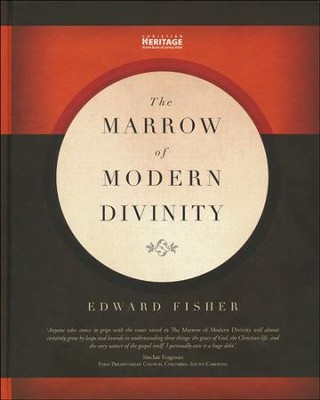I recently wrote a post on Gospel Pardon as part of my interaction with Edward Fisher’s The Marrow of Modern Divinity. That book is about the errors of both legalism and antinomianism. In that post I mentioned Andrew Farley’s The Naked Gospel which I had read and reviewed earlier this year ( Part 1, 2, 3, 4 and 5 with increasing frustration). He has what I consider to be extreme views based on a hyper-dispensationalistic hermeneutic. We engaged in an on-line discussion where it became increasingly clear to me that we were talking past each other as a result of our very different approaches to interpreting Scripture.
recently wrote a post on Gospel Pardon as part of my interaction with Edward Fisher’s The Marrow of Modern Divinity. That book is about the errors of both legalism and antinomianism. In that post I mentioned Andrew Farley’s The Naked Gospel which I had read and reviewed earlier this year ( Part 1, 2, 3, 4 and 5 with increasing frustration). He has what I consider to be extreme views based on a hyper-dispensationalistic hermeneutic. We engaged in an on-line discussion where it became increasingly clear to me that we were talking past each other as a result of our very different approaches to interpreting Scripture.
While I thought I was ending communication he left one last ginormous comment. So, I’ll use that comment to have one last installment of our discussion. If you have questions about the relationship of the OT and NT, law and gospel, and what really is the rule of life for Christians you may find some interesting points made here. Then again ….
Thanks for this! It’s been fun to dialogue. The ideas you are presenting are familiar to me, but it has been good practice for me to think about which Scriptures to share. In this post, I will clarify that:
1. the New Covenant was put into effect at Jesus’ death (Hebrews 9:16-17)
This is not at issue at all. What is at issue is the relationship between the Old Covenant and New Covenant. Both the Old and New Covenants were manifestations of the Covenant of Grace (Live & Do This). As we will note later, some treated the Old Covenant as if it was the Covenant of Works (Do this & live). As John Piper notes, “The flesh turns the law into a ladder.” As people born in Adam (Romans 5), we are under the covenant of works. As a result the Law works death in us since we are sinners. But even the Mosaic covenant was given to redeemed people. It was not given for them to earn life, but to manifest life. All who believe in the promises of God (keeping in mind the progressive nature of revelation, we know more than Abraham) are under the Covenant of Grace. This why Hebrews 4:2 says they (the wilderness generation) had the gospel preached to them. The gospel is not only in the New Covenant. In fact, Paul often uses OT figures to explain the truth of the gospel. For instance, Paul quotes Ps. 32 about the bliss of forgiveness/justification in Romans 4. You’ll note it is not tied to the sacrificial system but his confession of sin as the instrumental means (this after David had been a believer for years- gospel pardon!)
The Old and New Covenants are not identical though. There was real progress, and the issue in Hebrews was a temptation to leave the newer, better covenant for the Old Covenant, which at that point in the history of redemption (and now) amounts to apostasy.
2. Jesus was born under Law (Galatians 4:4) and his audience was too (Galatians 4:4) and Jesus expanded on the Law (Matthew 5:21-48).
Yes, Jesus redeems all those under the Law as a Covenant of Works. He does this in 2 ways. First, he perfectly fulfilled the law as our Substitute. Second, he suffered the curse of the law as our Substitute (Galatians 3).
3. The Lord’s Prayer teaches a conditional forgiveness (“as we forgive others”) while in contrast Colossians 3:13 and Ephesians 4:32 teach the opposite (unconditional forgiveness) after Jesus’ death and resurrection.
I’m not so sure it teaches conditional forgiveness. But if it did … think about who is teaching this. Am I to disregard anything the Eternal Son of God in flesh teaches? In your hermaneutic, yes. In a biblical one? No. We find no basis for this, unless we do violence to 2 Timothy 3 as you have done by neglecting ALL that Paul says the law is useful for.
In fact, the Great Commission (given AFTER his death & resurrection!!) includes the instruction to “teach them to obey EVERYTHING I have commanded you.” That would seem to include how to pray from earlier in that same gospel.
